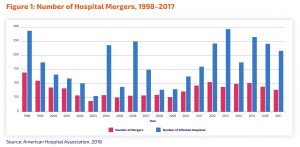The Biden administration is clamping down on hospital mergers and ramping up enforcement of surprise billing laws.
Meanwhile, most hospitals are pretty much ignoring the requirement that they post prices. and are going to the mattresses to fight over mergers. (going to the mattresses is what Mafioso did back in the day during major turf battles)

I’ve written extensively about the impact of mergers on cost – it goes up, a lot – and quality – no evidence that it improves. But this isn’t just about hospitals, it is about the entire healthcare system and where it is headed.
Hospitals accounted for $1.2 TRILLION in spending back in 2018
Price is the reason healthcare is so damn expensive here compared to other developed countries; and price is driven more and more by hospitals. Pricing power is how hospitals and health systems generate ever margins, pricing power is what they get when hospitals merge and reduce competition in markets.
This from Cooper and Gaynor:
A number of studies have examined individual hospital mergers and found price increases of greater than 20% (e.g., Town and Vistnes 2001, Krishnan 2001, Vita and Sacher 2001, Gaynor and Vogt 2003, Capps et al. 2003, Capps and Dranove 2004, Dafny 2009, Thompson 2011, Tenn 2011, Gowrisankaran et al. 2015).
The FTC has conducted a series of merger retrospectives. These analyses have found price increases of 20% to 50% (Haas-Wilson and Garmon 2011, Tenn 2011, Thompson 2011).
There has also been work analyzing “cross-market mergers” of hospitals that are not geographically proximate competitors (Dafny, Ho, and Lee 2019, Lewis and Pflum 2017). These studies have observed cross-market merger effects that raised prices between 10% and 17%.
That’s how Tenet reported record profits last quarter, it’s why Michigan’s two largest systems are merging.
The merger thing has gone on so long that 4 out of 5 hospital market areas are “highly consolidated” – meaning the locally-dominant health systems have pricing power, and can use that to dictate prices to payers of all kinds. Mergers peaked several years ago – not because they are losing popularity, but rather because there just aren’t that many merger targets any more.

Because hospitals thrive on profitable services, we’re seeing cutbacks in less-profitable lines, cutbacks that are limiting the availability of services especially in rural and under-served areas.
What does this mean for you?
We have got to get control of the hospital beast before it eats us alive.



With Medicare and Medicaid basically fixed rates, this leave only the commercial plans as revenue sources to not only recover deficits in Medicare/Medicaid rates, but margins on Medicare/Medicaid, as well as profitability levels desired. No one should be supped when Oligarchies and Monopolies act monopolistically. These are government granted licenses, which exchange generally tax-exemptions for “community benefit”, yet as the Lowen Institute recently reported, hospital’s give-back to their communities is in deficient compared to their tax advantages, never mind their exploration of their monopoly. Add to this, their imperialistic tendencies to purchase physician practices, (to assure referrals to their higher cost ancillaries) and any competitive outpatient providers (Imaging, amb-surg) and you have the prefect example of abusive of power for self-enrichment and self-aggrandizement
Robert – thanks for the comment and perspective. Good points all.
be well – Joe